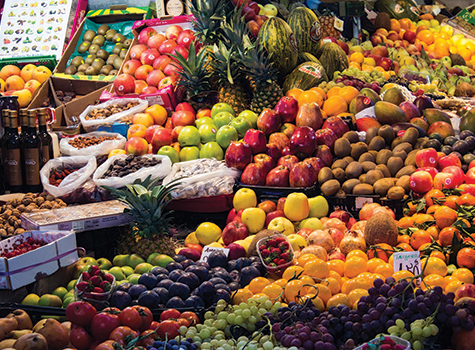By Parul Kharod

You may have heard your doctor recommend eating a Mediterranean Diet for heart health. Let us explore what it means to eat a Mediterranean Diet, and how can we modify it to desi taste?
One of the most well-researched diets for over half a century, the Mediterranean Diet is backed by a robust body of scientific research to enhance longevity and improve quality of life. The Mediterranean Diet has also been ranked #1 Easiest Diet to Follow and #1 Best Diet for Diabetes, High Cholesterol, Gut Health, Mental Health, Inflammation, and many other health conditions.
What is the Mediterranean Diet?
“Mediterranean Diet” is a generic term based on the traditional eating habits in the countries bordering the Mediterranean Sea. There is no single standard Mediterranean diet as there are several countries around the Mediterranean Sea. Eating styles among these countries, and even among regions within each country, are different because of differences in culture, ethnic background, religion, economy, geography, and agricultural production. In this sense it is quite like Indian cuisine.
Most people associate the Mediterranean Diet with Greek, Lebanese, or Italian food. But there are more than twenty countries that surround the Mediterranean Sea and include countries from Eastern Europe and North Africa, including Morocco, Malta, Spain, and Lebanon.
Common foods included in a Mediterranean Diet
Overall, the Mediterranean Diet mostly emphasizes plant-based foods, focusing on overall diet quality rather than specific nutrients.
• Fruits and vegetables
• Nuts and seeds
• Beans and legumes – lentils, chickpeas, cannellini beans, and peas
• Whole grains like farro, buckwheat, bulgur, rice, and couscous
• Healthy fats and oils, including extra virgin olive oil
• Herbs and spices
• Small amounts of fish, seafood, lamb or chicken (optional)
What foods are not part of the Mediterranean Diet?
• Highly processed foods (such as sodas, sugary fruit juices and chips)
• Refined carbohydrates (processed sweets)
• High sodium foods (such as ready to eat snacks and packaged/frozen ready to eat foods)
• High fat greasy foods and foods with saturated fats and trans fats
• Fast food
Benefits of the Mediterranean Diet
The Mediterranean diet is an eating pattern that emphasizes fruits, vegetables, whole grains, legumes, olive oil, and nuts. It has numerous health benefits, including:
Cardiovascular Health:
• Reduces the risk of heart disease, stroke, and high blood pressure
• Lowers cholesterol levels
• Provides heart-healthy unsaturated fats from olive oil and nuts
Metabolic Health:
• Help regulate blood sugar levels, reducing the risk of type 2 diabetes
• Improves insulin sensitivity
Gastrointestinal Health:
• Supports healthy gut microbiome, reducing inflammation and improving digestion
• Provides fiber from fruits, vegetables, and whole grains, which aids in digestion
Brain Health:
• Protects against cognitive decline and Alzheimer’s disease
• Improves memory and brain function
Anti-inflammatory Effects:
• Reduces inflammation throughout the body, which can benefit conditions like arthritis
• Contains foods rich in omega-3 fatty acids, which have anti-inflammatory properties
Other Benefits:
Improves mood and mental well-being, reduces the risk of certain cancers, prolongs life expectancy, and supports sustainable and environmentally friendly food choices. Overall, the Mediterranean Diet is a nutrient-rich and sustainable eating pattern that offers a wide range of health benefits.
How to follow a Mediterranean Diet?
• Eat a variety of colorful vegetables- salad, soup, or cooked sabzi
• Enjoy seasonal local fruits
• Include nuts and seeds regularly – almonds, walnuts, pistachios, cashews, sunflower seeds, pumpkin seeds, sesame seeds, etc
• Eat a variety of pulses and legumes – chickpeas, red kidney beans, black-eyed peas, lentils, and varieties of other daals
• Choose intact whole grains. Typically grains like farro, bulgur, barley, and freekeh are eaten in the Mediterranean countries. But we can adapt this to grains from our traditional cuisine such as cracked wheat, jowar, bajra, ragi, and other millets
• Herbs and spices such as parsley, basil, sage, sumac, za’atar, and garlic are the flavors of the Mediterranean Diet. We can use them as well as include our own commonly used spices and herbs
• Limit dairy to small amounts of yogurt. The Diet includes some cheeses such as feta, goat cheese, fresh mozzarella, and other freshly made cheese in small quantities. Avoid high fat cheeses, especially the processed cheese sticks and wrapped slices.
The Mediterranean Diet is not just about food. The reason it is associated with being healthy is because it includes other lifestyle factors.
Physical Activity – not just exercise or going to the gym but moving more. It also includes activities such as dancing, hiking, gardening, walking, and swimming.
Social Connections – stay connected with friends and family. Meet people more often. Volunteer or engage in your favorite hobby where you connect with others. Human connection is the best way to improve brain health and prevent memory loss.
Wine – The Mediterranean region is associated with wine as part of the daily diet. However, recent research which shows an increased risk of cancer with alcohol has prompted experts to change their recommendations. The new guidelines state to limit alcohol as much as possible.
The Mediterranean Diet is considered to the best for improved health and longevity. We can take the key aspects of the diet and modify it to our own foods. We also need to include the lifestyle factors mentioned. A word of caution. The lack of nutritional guidance regarding specific nutrients and amounts of foods or portion sizes can lead some people to consume excess calories if they are not careful. Please get advice from a Registered Dietitian to help customize your own plan and portions.
Parul Kharod is a registered dietitian and licensed nutritionist and works as a Clinical Dietitian. She can be reached at [email protected]


